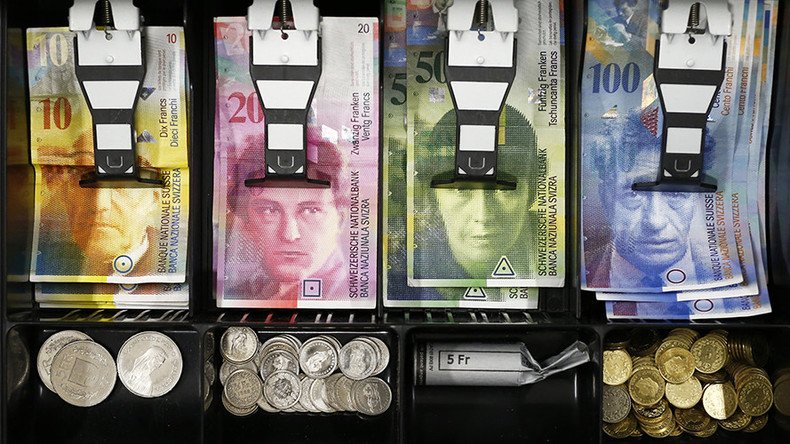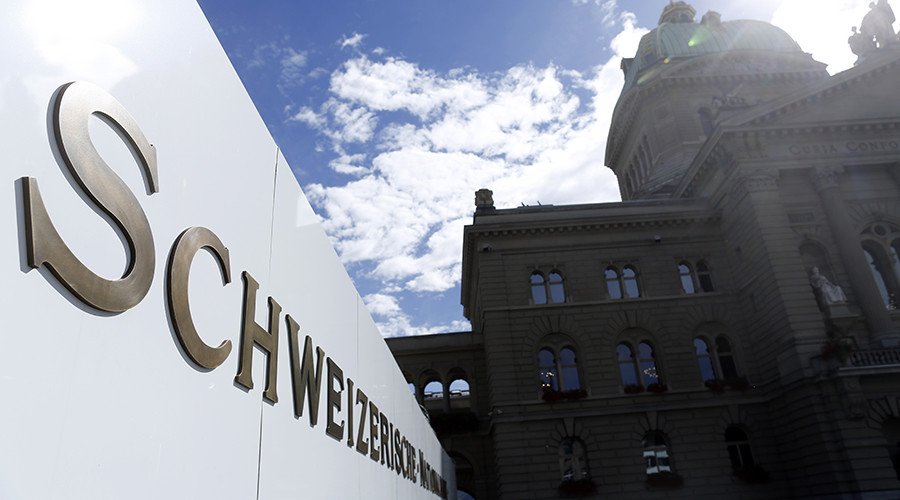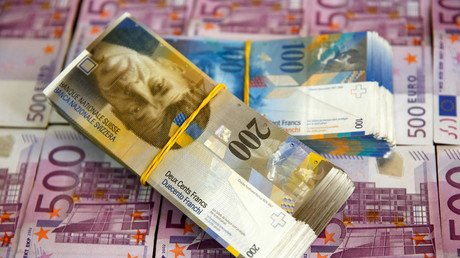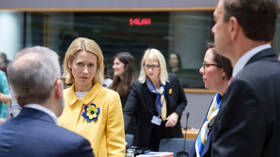Switzerland: Poised for a revolution?

When Iceland jailed its bankers something changed. The unthinkable had happened: the real criminals had been held to account. Now Switzerland is also threatening to go off the fiat-bankster reservation. But will it happen?
Josiah Stamp once said: “If you want to continue to be slaves of the banks and pay the cost of your own slavery, then let bankers continue to create money and control credit.”
Stamp knew whereof he spoke. Among his achievements, he was appointed a director of the Bank of England in 1928.
All so-called modern, civilized countries are under the boot of the very mechanism Stamp described. Very few countries managed to achieve highly developed societies without it, such as Libya, Iraq and Syria.
Those countries all have something else in common. Whatever can it be?
However, other countries which have yet to become targets for unprovoked genocide at the hands of US agencies are waking up and smelling the pinstriped tyranny.
Switzerland, for example: hardly a place traditionally associated with wild-eyed fanaticism, Switzerland is set to vote on banning banks from creating money.
The English play football, drink beer and beat each other up in town centers in the evenings. The French pout and shrug and make simple things take a long time and cost a lot. The Swiss provide money a safe, boring place where nothing dramatic will happen to it, so that it may then be passed on to the next generation of rich people – preferably in an amount greater than was received – by this generation of rich people.
So money is at the heart of what Switzerland does.
Switzerland is also home to the Bank of International Settlements, which – while it sounds as exciting as double-entry bookkeeping – is, in fact, the spider at the center of the entire financial web.
In an article entitled "Switzerland to vote on banning banks from creating money" the Telegraph reports: “Switzerland will hold a referendum to decide whether to ban commercial banks from creating money.
The Swiss federal government confirmed on Thursday that it would hold a plebiscite, after more than 110,000 people signed a petition calling for the central bank to be given sole power to create money in the financial system.
The campaign - led by the Swiss Sovereign Money movement and known as the Vollgeld initiative - is designed to limit financial speculation by requiring private banks to hold 100pc reserves against their deposits.”
This sounds incredibly dull, doesn’t it? But the idea behind it is what revolutions are made of.
The article continues: “Banks won’t be able to create money for themselves any more, they’ll only be able to lend money that they have from savers or other banks, said the campaign group.”
I’ll repeat that bit: they’ll only be able to lend money that they have from savers or other banks.
That’s probably what you think banks do: lend money they acquire from savers or other banks.
But no! They are busy creating money (albeit by a circuitous route); that is, they are busy magicking that thing the rest of us spend our lives working so hard to obtain – money – into existence. They do it by means of the creation of an imaginary thing called debt. We then undertake to pay these fictional notions back, and do so with interest.
Not only is this outright fraud and theft against the poor sap who signed the original credit agreement, it also debases the value of every single unit of the currency in which the transaction takes place.
Put in business terms, it is equivalent to printing more shares.
Every time a company’s board elects to do that, the value of existing shares is diluted unless there is an equivalent increase in the value of the company which, in the case of the kind of debt banks create – being both usurious and fiat in nature – there isn’t.
The article continues: “The SNB (Swiss National Bank) was established in 1891, with exclusive power to mint coins and issue Swiss banknotes.
However, over 90 percent of money in circulation in Switzerland now exists in the form of "electronic" cash created by private banks, rather than the central bank.
‘Due to the emergence of electronic payment transactions, banks have regained the opportunity to create their own money,’ said the Swiss Sovereign Money campaign.
'The decision taken by the people in 1891 has fallen into oblivion.'"

That is correct: if we had access to the same computer terminals the banks have, we could magic in or out of existence all the imaginary stuff we are trained to think of as important – money – in whatever quantities we liked.
This is how it works: when they print quite a lot of this stuff there is a boom. When they print too much of it, there is inflation (actually, the printing of money is inflation). When they stop printing it or simply hold on to it, there is a depression.
As long as the people keep slaving away and let the bankers give them pieces of paper or blips on a computer screen in exchange for their blood, sweat and tears, everything is fine.
But if a nation begins to wake up to the con and starts pushing back it is visited by a color revolution, cultural invasion, or simply bombed back into the Stone Age.
That’s it. You now understand economics.
We are trained from birth to think we need the banks and their paper fictions because the same people who own the banks also direct our centralized systems of education, as well as own media and entertainment.
But we don’t need them. Anything can be used as a medium of exchange. Britain became a world power based on an economy in which taxes were paid using bits of wood.
At the macro-level, the US currency is essentially worthless; once oil is traded widely in any currency other than dollars, the US economy will collapse since there will be no reason for the rest of the world to buy its dollars.
At the micro-level, a ground-shift is occurring as more people understand that real friends with a functioning vegetable garden are worth more than a suitcase full of fictional money, or a job you hate that you could lose at any moment. Barter is now booming in Greece – a country sucked into financial oblivion by the money men at Goldman Sachs.
Now back to the prospective plebiscite in Switzerland.
I am skeptical that this duck will get airborne without being shot down. The democracy the Swiss think they have is a pleasant enough fiction, but I am sure it will never be allowed to interfere with business.
And if we read the article carefully, it does say that the central bank should be given sole right to create money. This would essentially leave the creation of money in the same hands as those who control the Federal Reserve or the Bank of England rather than allow them to farm out the process. But at least it shows that people are beginning to wake up to where the true power lies.
In the unlikely event that this grass-roots movement in Switzerland should get its way and its proposed legislation be enacted, and then begin to morph into something which really does threaten the banking elite, we must not be surprised if Switzerland is shortly discovered to be harboring weapons of mass destruction, or to have masterminded 9/11, or to be financing Islamic State.
Yes, we will need to brace ourselves to be educated by a Western media unanimous in pointing out the connections to be made between the production of precision watches, pavements so clean you can eat your lunch off them, and the evil of an irrational hatred of freedom – one with roots in a culture which tacitly supports jihad against all non-eaters of expensive confectionary.
Freedom. You’ve got to love it!
The statements, views and opinions expressed in this column are solely those of the author and do not necessarily represent those of RT.















